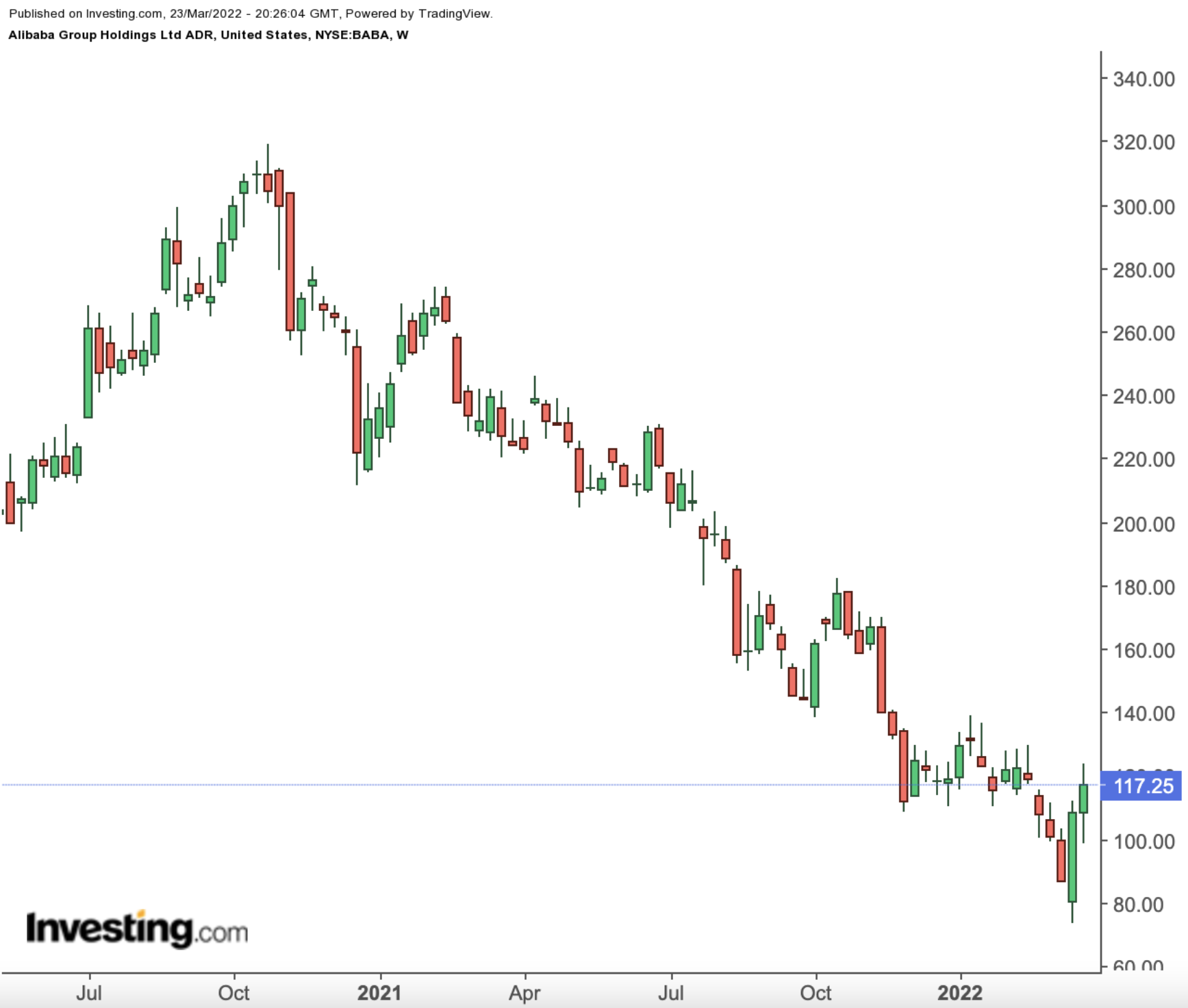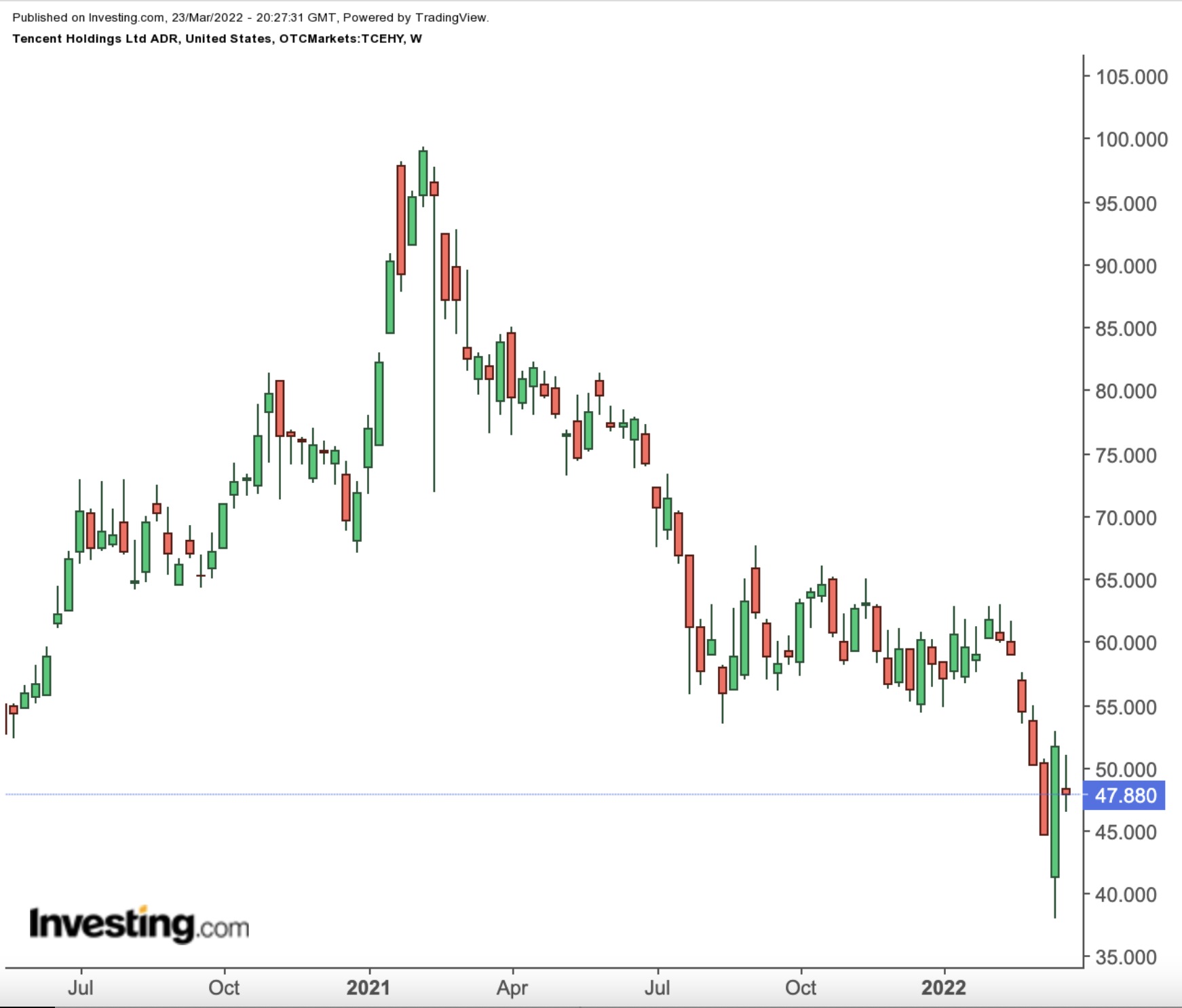| Followers | 679 |
| Posts | 140823 |
| Boards Moderated | 36 |
| Alias Born | 03/10/2004 |
Thursday, March 24, 2022 2:03:18 PM
By: Investing.com | March 24, 2022
After taking multiple blows during the past year, Chinese mega cap stocks are beginning to show signs of life again. Last week, the Asian country's top policymaker revealed intentions to stabilize and support its beaten-down capital markets. The announcement triggered an unprecedented daily 33% jump for the NASDAQ Golden Dragon China index of companies listed in the US, its largest advance on record.
The e-commerce giant Alibaba (NYSE:BABA) has rallied an impressive 52.7% since. It closed Wednesday at $117.24.

BABA Weekly Chart
Similarly, gaming and social media behemoth Tencent Holdings (OTC:TCEHY) gained 21.4% during the same period. It closed Wednesday at $47.880.

TCEHY Weekly Chart
In a series of statements, China's top economic officials reassured investors that a sweeping crackdown on internet companies was nearing its end. Furthermore, the country's banking regulator said it would support insurance companies to increase investment in stock markets, which have been in the grip of intense selling pressure.
However, this government-engineered reversal can't remove the many macroeconomic headwinds that remain in play. One of the biggest is the Russia-Ukraine conflict—in which China, seemingly allied with Russia, appears to be on the wrong side.
China's alleged backing of Moscow in its war with Ukraine is fueling speculations that the world's second largest economy and its companies could face US sanctions if the conflict escalates.
Many investors have begun asking whether Chinese companies are still worth the risk after meeting unprecedented losses on their holdings during the past year.
Rising Geopolitical and Macro Risks
JPMorgan Chase last week downgraded 28 Chinese internet stocks, including Alibaba and Tencent Holdings, calling them "uninvestable" over the next 6 to 12 months due to rising geopolitical and macro risks. Any decision by the US to impose new sanctions on China or individual Chinese firms doing business with Russia is the biggest concern for stock investors.
Another uncertainty that will continue to weigh on these stocks is the push by the SEC to get access to financial data on foreign companies listed on the US exchanges. According to the Wall Street Journal, US regulators could not inspect working papers for five US-listed Chinese companies on Thursday. Among those names are the biotechnology group BeiGene (NASDAQ:BGNE) and Yum China Holdings (NYSE:YUMC), the operator of KFC in China.
The 2020 Holding Foreign Companies Accountable Act enacts a trading prohibition for companies that fail to provide audit papers for three straight years.
Rising Domestic Risks
Even if investors ignore these macro risks, the growth story also doesn't seem too compelling. China's economy is slowing and it's late in the pandemic recovery cycle, with its cities and towns continuing to face lockdowns.
During the last year, China also pursued intense regulatory scrutiny of its technology companies as part of its push to break their monopolies and protect consumer data.
The Asian country has sought to introduce regulation in areas ranging from anti-trust to data protection. After a year of crackdowns, there are signs that these companies are now struggling to grow.
Alibaba told investors last month, during its earnings report, that it will now prioritize user retention over acquisition—a significant shift for a company that became the biggest technology company in China by pursuing relentless growth. Its latest quarterly earnings reported the slowest revenue growth since it went public.
Alibaba's US-listed shares got a boost from its increased share buyback plan, announced this week. Nevertheless, the company lost about half of its value in the past year.
Tencent, which reported its latest quarterly earnings yesterday, showed its slowest pace of quarterly growth on record, hurt by weak online advertising and revenue from gaming.
Tencent has lost more than $470 billion from its peak in 2021, even though it has largely escaped Beijing's direct scrutiny.
Bottom Line
Investing in Chinese stocks remains a risky bet, given the multiple hazards that investors in Chinese companies face. While there are signs that China is willing to ease pressure on its tech giants, it isn't easy to imagine how these companies will manage to show rapid expansions that warrant premium valuations they once enjoyed.
Investors, therefore, are better off staying on the sidelines, in our view.
Read Full Story »»»
 DiscoverGold
DiscoverGold
Information posted to this board is not meant to suggest any specific action, but to point out the technical signs that can help our readers make their own specific decisions. Caveat emptor!
• DiscoverGold
Recent TCEHY News
- Wall Street Highlights: Apple Appeals Watch Ban, Tesla to Launch Updated Model Y, and More • IH Market News • 12/27/2023 11:08:22 AM
- Correction to Global Gaming Stocks Article • Dow Jones News • 12/22/2023 12:32:00 PM
- Global Gaming Shares Dive After China Proposes Online-Gaming Curbs -- 2nd Update • Dow Jones News • 12/22/2023 12:13:00 PM
- Global Gaming Shares Fall After Draft China Rules Released -- Update • Dow Jones News • 12/22/2023 10:28:00 AM
- Moody’s Reassesses China, GitLab Exceeds Estimates, Twilio Plans Major Layoffs, and More • IH Market News • 12/05/2023 11:25:58 AM
- Canada Bans WeChat, Kaspersky Apps on Government Devices • Dow Jones News • 10/30/2023 05:12:00 PM
- Crypto This Friday: THORSwap Resumes Operations, Paolo Ardoino Takes Over as Tether CEO, and More • IH Market News • 10/13/2023 05:46:35 PM
- New Alibaba Group CEO Lays Out Strategic Priorities For Staff • IH Market News • 09/12/2023 11:11:16 AM
Axis Technologies Group and Carbonis Forge Ahead with New Digital Carbon Credit Technology • AXTG • Apr 24, 2024 3:00 AM
North Bay Resources Announces Successful Equipment Test at Bishop Gold Mill, Inyo County, California • NBRI • Apr 23, 2024 9:41 AM
Epazz, Inc.: CryObo, Inc. solar Bitcoin operations will issue tokens • EPAZ • Apr 23, 2024 9:20 AM
Avant Technologies Launches Advanced AI Supercomputing Network and Expansive Data Solutions • AVAI • Apr 23, 2024 8:00 AM
BestGrowthStocks.com Issues Comprehensive Analysis of Triller Merger with AGBA Group Holding Limited • AGBA • Apr 22, 2024 1:00 PM
Cannabix Technologies to Present Marijuana Breathalyzer Technology at International Association for Chemical Testing (IACT) Conference in California • BLO • Apr 22, 2024 8:49 AM









